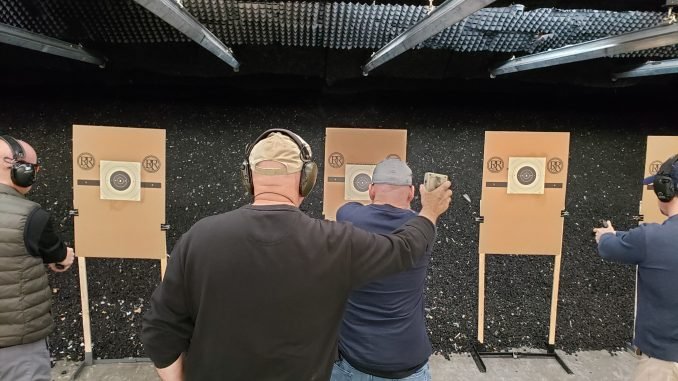
I first began training with Tom Givens and the Rangemaster crew in 2019. Since then, I’ve taken his Advanced, and Master pistol instructor courses, and his shotgun instructor course. When Tom announced the creation of the Professional Pistolcraft course, I jumped on the opportunity. Only open to graduates of the Master class, my group was the first iteration of the PPI. With the training bar set high, how does this course compare? Check out the details below!
Location
Royal Range, Nashville, Tennessee
Weather
With the Royal Range being an indoor facility, weather didn’t particularly matter. That said, temperatures were pleasant outside, needing only a sweater or light jacket, with plenty of sunlight.
Equipment for the Rangemaster Professional Pistolcraft Instructor Development Course
The equipment list for the Rangemaster Professional Pistolcraft Instructor Development Course is significantly pared down from the Master course. I shot the course using my gen4 Glock 17, equipped with a Trijicon RMR and Ameriglo sights. My holster was the Lexington from KSG Armory, with magazine pouches from Esstac and an Amazon no-name. This was supported by a Foundation belt from EDC Belt Co.
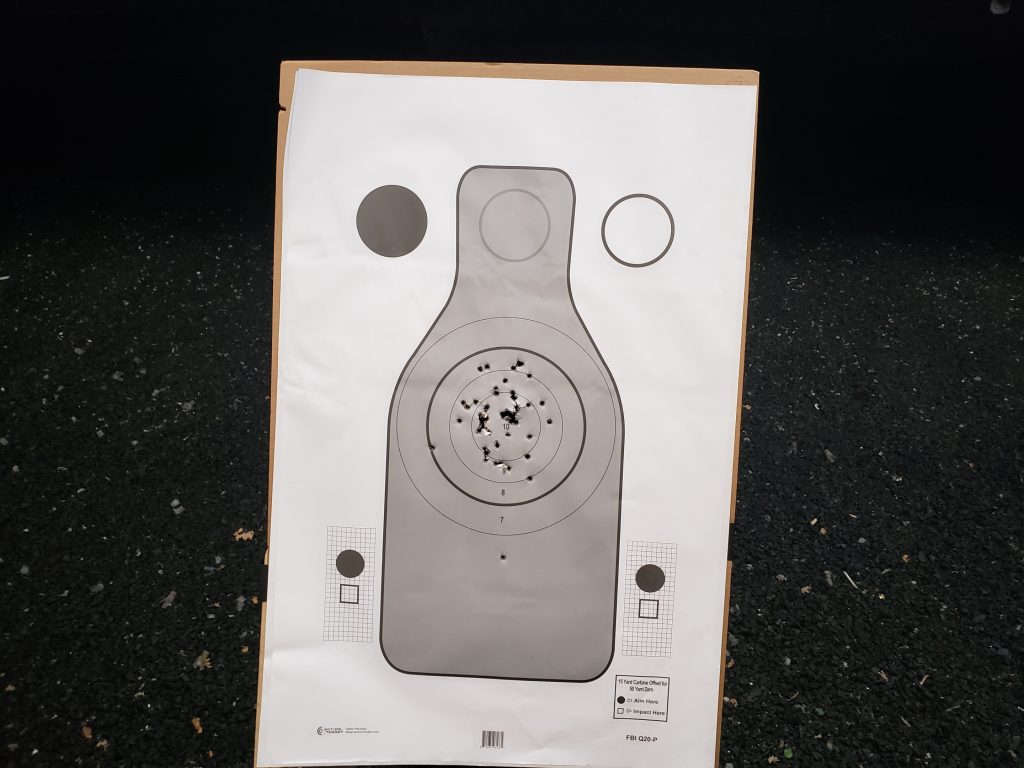
Other students use a mix of Glock, M&P, Staccato, and P320 pistols, with a P365 X-Macro, and a Springfield XD also making an appearance. Almost everyone is using an optic, with only five of twenty-two students shooting exclusively irons. Optics include the Trijicon RMR and SRO, Aimpoint ACRO P-2, Holosun 507C/509T. Most students shoot from AIWB concealment, with a handful using strong side IWB, and one or two duty rigs. A fair number of people sport Streamlight TLR-1 or Surefire X300U weapon lights, though no low light training will occur this weekend.
Personnel
A total of 22 students are in class, including myself, with two being female. Ages range from the mid-20’s to mid 60’s. Backgrounds include current and former military and law enforcement, farmers, doctors, range owners, and more. One student arrives on crutches, having been injured just a few days before class.
Day One of the Rangemaster Professional Pistolcraft Instructor Development Course
Day one of the Rangemaster Professional Pistolcraft Instructor Development Course starts with introductions from the students and staff. There are a lot of familiar faces here from over the years, with a handful of new ones mixed in. Once intros are complete, Tom moves into the history of training, focusing on the 1960’s to present day. This includes driving forces behind change, such as the Southwest Combat Pistol League, the Newhall shooting, and more. With these we see how some “revolutions” are actually cyclical, while others are actually revolutionary.
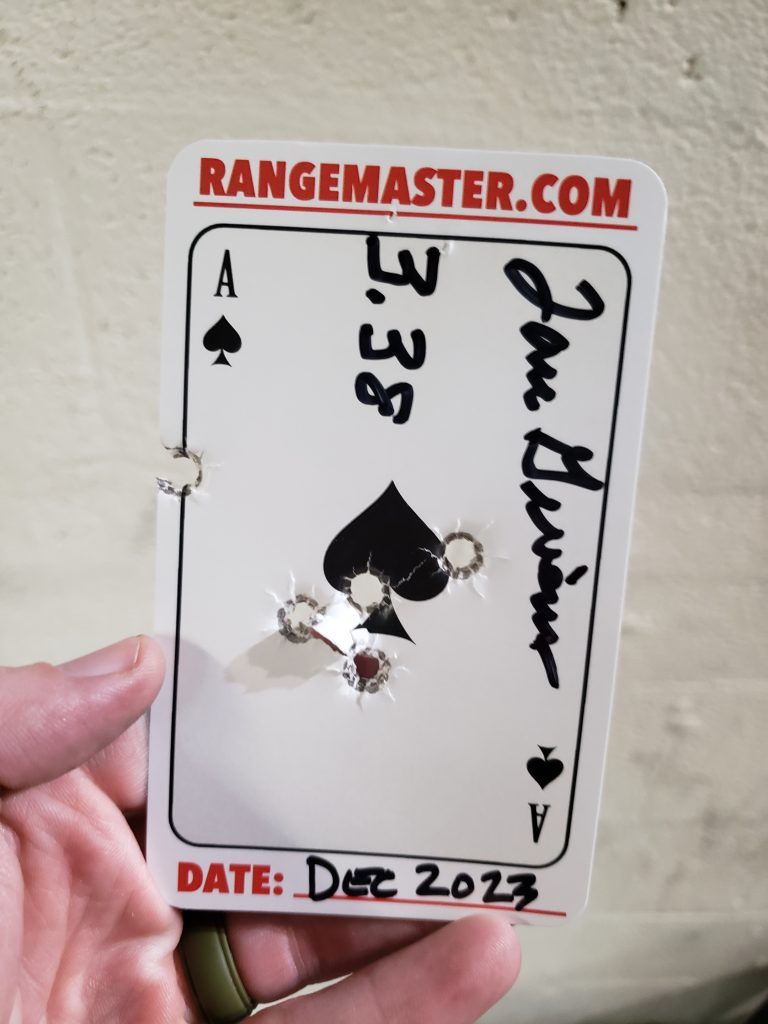
From here we lead into a lecture on mindset and maintaining awareness. This includes Colonel Cooper’s color code, along with specific tips to help sharpen your mind. Next we cover the detection of surveillance from criminals, and what to do if we think we’re being followed. The goal here isn’t to cause paranoia, but to ensure we’re not being followed for an assault at our home. That leads directly into surveillance detection for domestic terrorist activity. Examples are given regarding terror plots thwarted by citizens in Israel, along with in the US for the difference a regular person can make. Before lunch we receive academics about active shooter situations, along with the common street robbery. What to look for, how to avoid them, potential responses, and more.
Range Time on Day One
After lunch we make our way to the range. We start shooting the Double-and-One drill, which I bring in an 89/100 after a yip on one round. Immediately following this, we fire the new FBI instructor qualification course on their new target. This 2019 version is definitely a step up from their old course, and I land a 98% on our one attempt. We fire a few more drills, then wrap up the day with a Rangemaster Bullseye Course, and the Rangemaster Advanced Instructor Course Qualification. I land a 288/300 on the bullseye course, then a 99 on the Advanced qual. This shows some nice growth for me, as I struggled during my Advanced IC back in 2020.
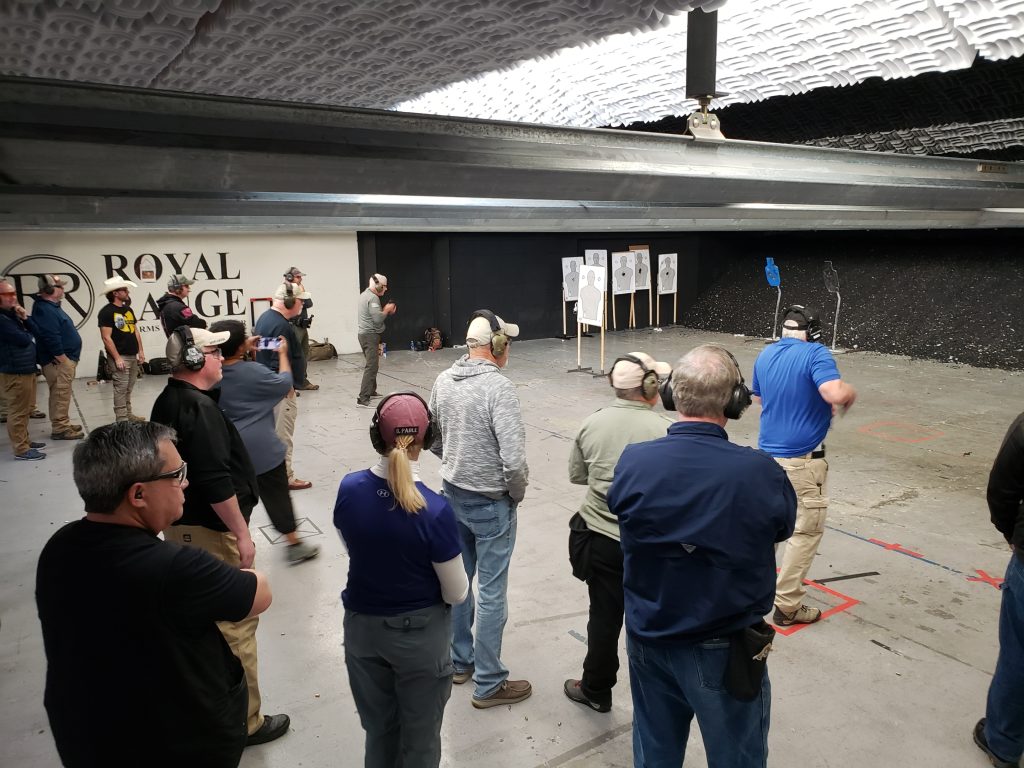
The day ends with expectations and guidance for the following day. Tom assigns us homework of reading the entire handgun section of the Complete Book Of Shooting; Tom has provided each student with an original copy to keep for themselves.
Day Two of the Rangemaster Professional Pistolcraft Instructor Development Course
Day two starts with an in-depth lecture about active shooters in the United States. Tom gives multiple examples of shootings stopped by law enforcement, along with those stopped by armed citizens. In short, things often stop much more quickly when there is a conceal carrier present, rather than waiting for police response. Additional consideration is made for the delay in medical response, typically requiring the scene to be cleared before they can take action. Tom covers our response to LE in these scenarios as well, hoping to avoid mistaken-identity shootings.
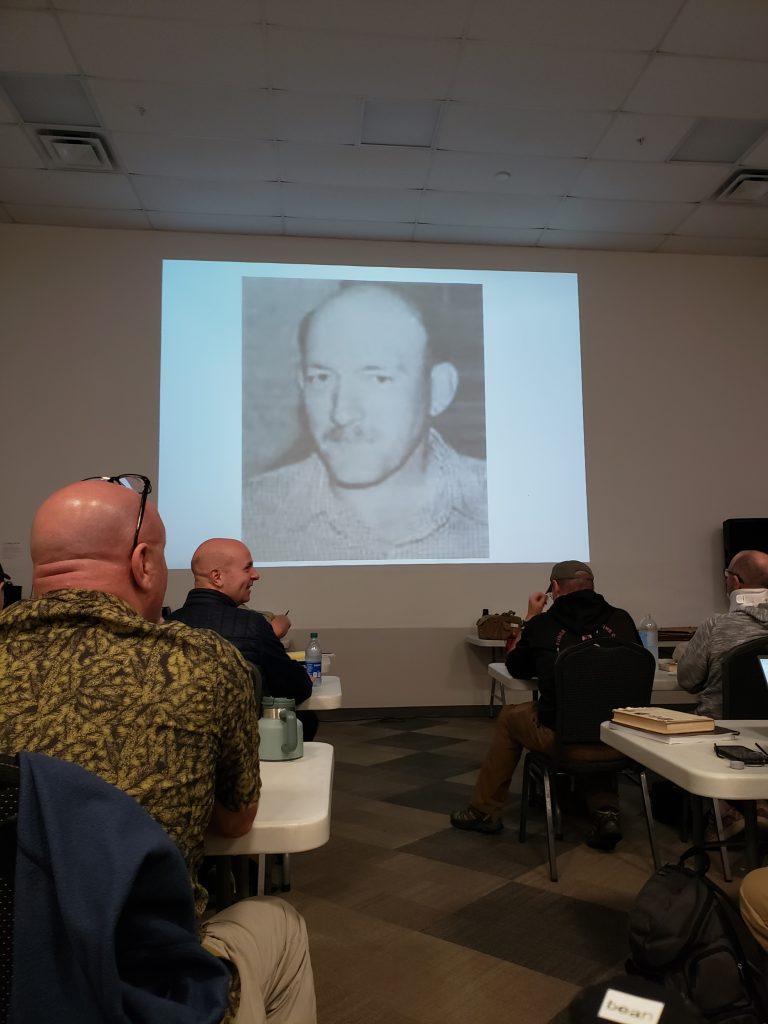
Next, we move into a lecture on home invasions. There are several examples given, with deep dives taken on each to explain what happened and how. Many statistics are given to help students understand the context in which home invasions occur, then we cover prevention methods. These include physical measures, along with intelligent communication–or lack thereof–to help avoid the situation entirely.
Before lunch we make a quick trip to the range, firing a handful of drills. This is topped off with another Advanced IC qualification where I shoot a perfect score. At this time, my Ameriglo front sight falls off. Irons never fail, right?
Afternoon Range Time of Day Two
After lunch we return to the range. We begin by practicing the first stage of our final qual; 3 rounds freestyle, 3 rounds strong hand only, 3 rounds weak hand only. Next Tom has us practice pivots, 90 degrees from either side, along with 180 degree turns. That takes us directly into El Presidente, where I bring in an 11.58 with penalties, with our top shooter nailing 8.26 clean. After that we do a couple of Man on Man shoot-offs, giving us some mild stress of direct competition. I have a narrow win against Brian DeKind on our first matchup. The second contest ends with Rick Remington and Dr. Troy Miller going shot-for-shot over and over again.
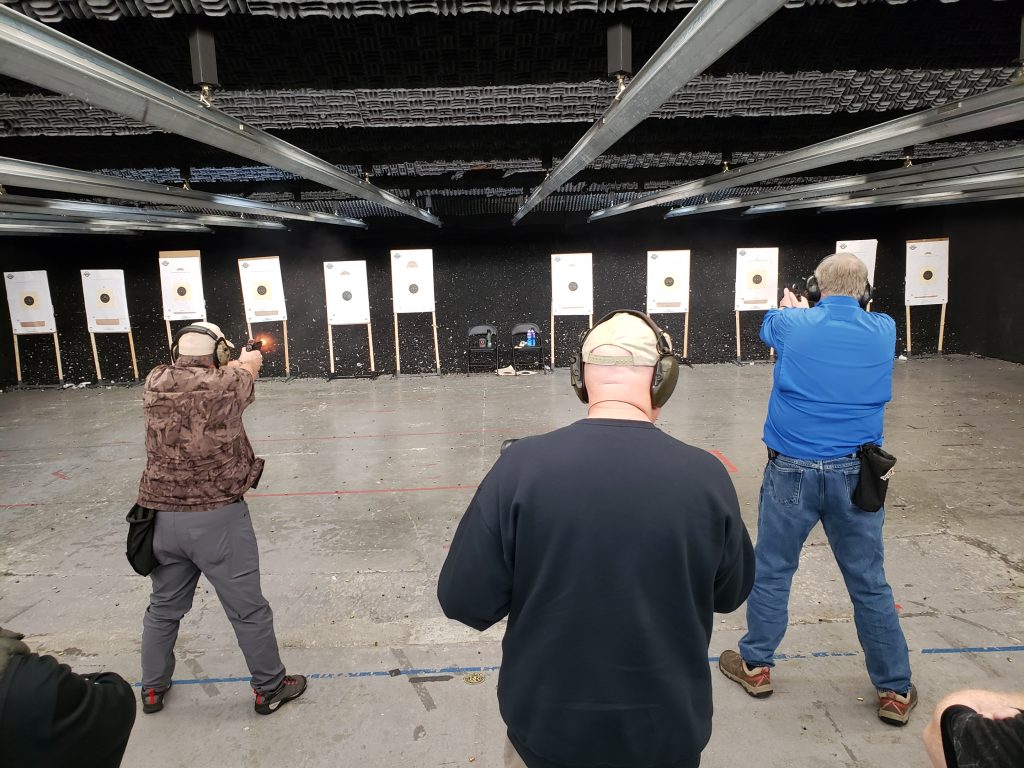
After this we each get a run at the Casino Drill, where I make an 18.03 with a few errors, and our top shooter Tim Kelly lands a 13.26. Next we get our first practice run on the Professional Pistolcraft Qualification. I have a small miss after flinching during a trigger press from my neighbor ND’ing into the floor on his drawstroke. Then come up one round short after failing to top off of magazine after the Casino Drill. In total, I still manage a 92% despite these issues. We wrap up the day with a 5×5 into a playing card, that I clean in 3.38.
During this day, my front sight loosens up two more times, despite using thread locker and a tool. No optics fail during class, but one Holosun does strip its battery tray screw. Tom gives us tomorrow’s expectations, then we head home.
Day Three of the Rangemaster Professional Pistolcraft Instructor Development Course
The final day of training begins with a discussion on our homework from the previous two nights. We talk about changes to mindset, training standards, techniques, and more between today and when Colonel Cooper wrote his section of The Complete Book of Shooting. After this we watch a recorded lecture of the man himself discussing mindset, with most shooters never having seen his work previously. Most people are surprised at how relevant this interview still is today, despite being older than several people sitting in the room. Once our discussion wraps, we head to the range.
Range Time of Day Three
Our first drill is a cold run of the Rangemaster Baseline Assessment Drill, which I land a 195 on. Next we shoot the Rangemaster Advanced Bullseye Course for a challenge coin. I don’t win the coin, but I do get a respectable 98%. As part of our qualification, we once again shoot the BAD, and I slightly improve my score to 198.

Range time ends with two runs at the Professional Pistolcraft Instructor qualification course of fire. I make a 98 on both attempts, which is a number I keep seeing across the weekend. It’s enough on our two tests to earn a coin, but not good enough for Top Shot. Once scores are taken, we return to the classroom.
Back in the Classroom during the Rangemaster Professional Pistolcraft Instructor Development Course
Once we take our seats, Dr. Andy Anderson begins a lecture on tactical anatomy. He busts some myths regarding caliber selection and shot placement, then gives a deep dive on anatomy. Using 3D graphics and real world photos, students get an opportunity to see how the body actually functions, and how bullets interact with it. A lot of people have “ah-ha” moments here, never before looking into how things like this actually work.
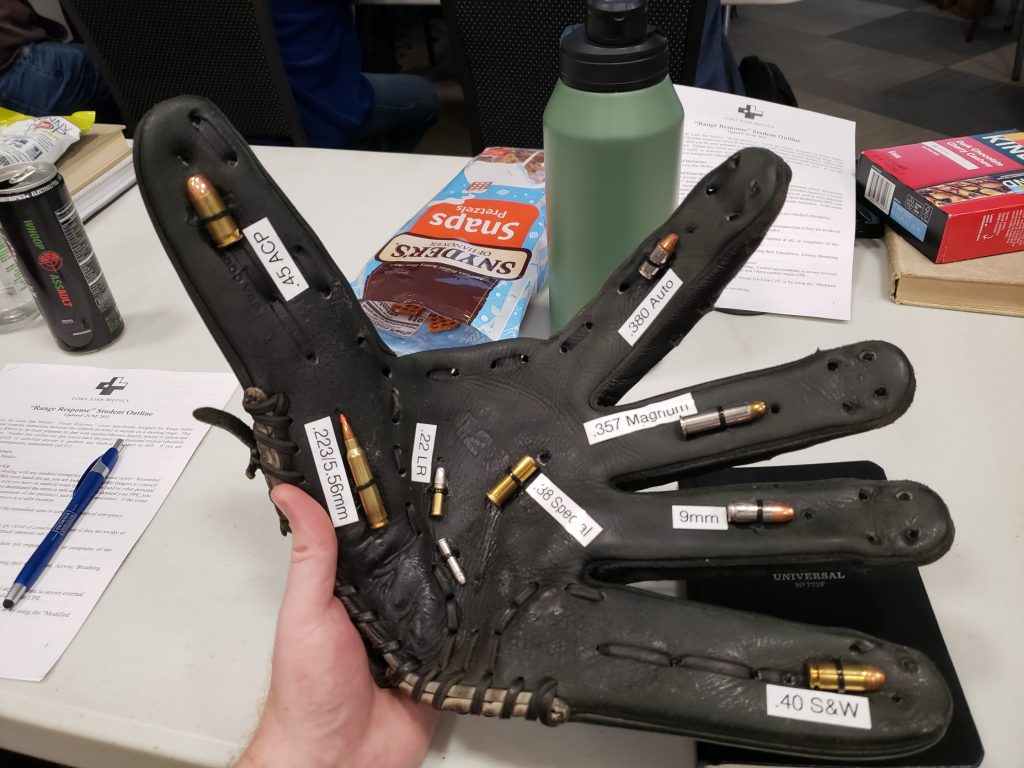
Next, Dr. Troy Miller gives a presentation on range medical response plans. Using the MARCH acronym, he goes through common emergencies, and our response to them. As part of this, each student gets a template response plan. We also go over how to build our own medical kits for ourselves and to bring to the range. While not quite as sexy as the previous lecture, I think this subject is something that is often overlooked. As someone who has witnessed some potentially serious issues on the range, and has been designated the primary responder in classes, these lessons definitely need more attention from shooters.
Medical Exercises
Once lecture wraps up, Dr. Miller and Anderson set up stations for hands-on application. Troy has prepared dummies for us to practice applying tourniquets, and also provides some for us to use on ourselves. A surprising number of students struggle here, so this is absolutely valuable education, and a great refresher for those more familiar. On the other side of the classroom, Andy has a wound packing station set up, allowing students to practice with gauze. Again, a shocking number of students have no experience here, and are surprised by how much material will fit in a relatively small wound.
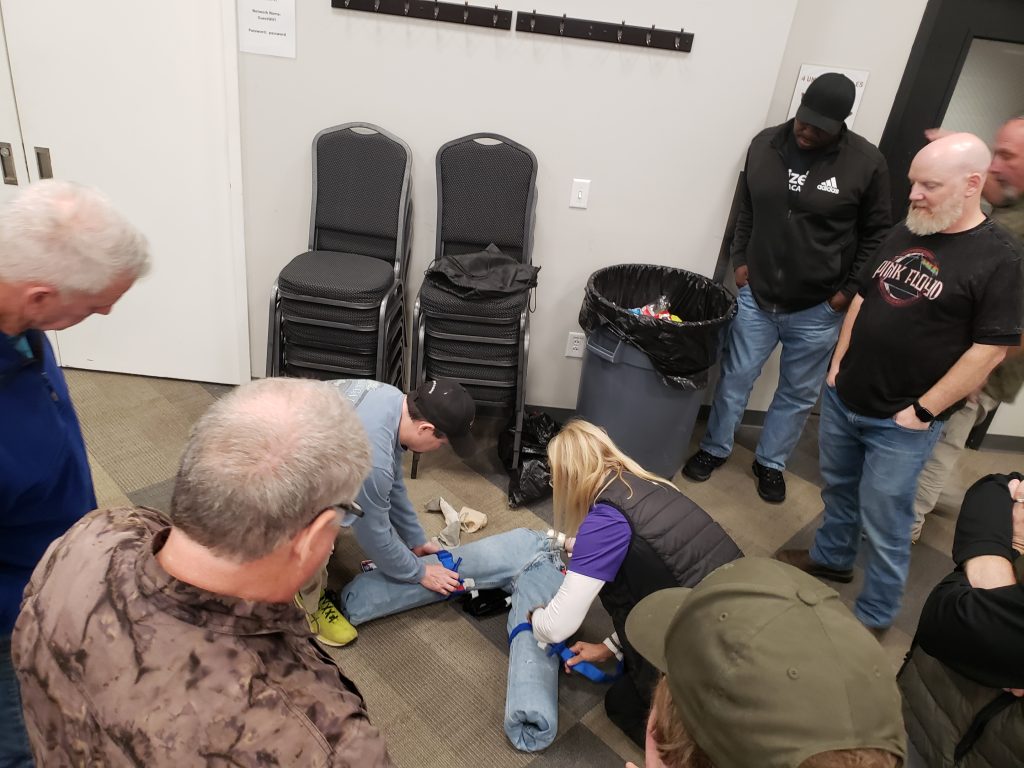
After this, Andy takes us over to a station for a demo on tension pneumothorax. Students get the opportunity to use decompression needles to “save” a dummy. This is something I haven’t seen before, and most of us take the opportunity to give it a try. While most of us don’t carry decompression needles in our kits, it’s still an interesting demo to participate in, and gives us something to consider.
Wrapping Things Up
We take a short break to reconfigure the classroom, then return to our seats. Tom solicits feedback from the group, then begins a drawing. Pulling names from a hat, a handful of students get books, gear, and more. I walk away with a copy of Shooting by J. Henry Fitzgerald.
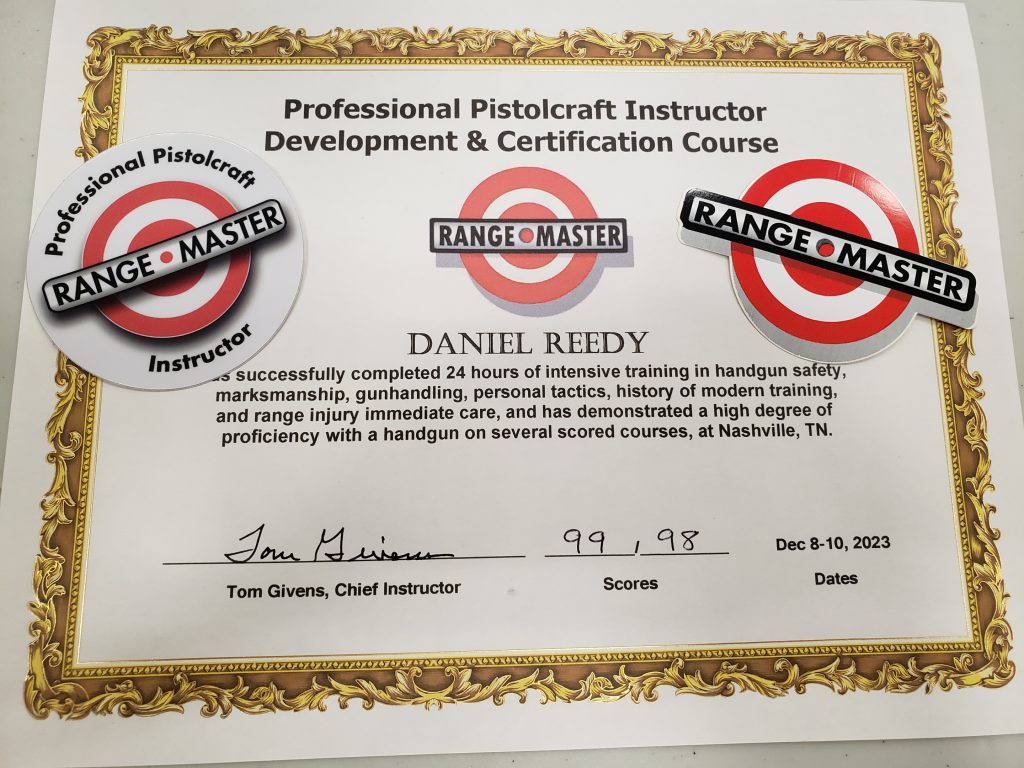
After this Tom gives out certificates, with Tim Chandler winning Top Shot. Unfortunately there are some students who do not make a passing grade, but that does show that the course isn’t a cakewalk. We gather for our class photo, then people begin the process of heading back home.
Final Thoughts on the Rangemaster Professional Pistolcraft Instructor Development Course
Overall I had a great time during the Rangemaster Professional Pistolcraft Instructor Development Course. The big stand-out for me was the medical lectures and hands-on training. Based upon student reactions, those were absolutely needed by the group, and I’m glad they’re a part of the curriculum. As always, Tom does a great job of presenting his information, and provides shooting tests which absolutely require work to pass.
The PPI is on-brand for Rangemaster courseware, and I would encourage graduates of the Master-level to sign up. You can check out Rangemaster for yourself >>HERE<<
Support My Work
If you made it this far, thanks for reading! Writing isn’t my full-time profession, and nearly everything I do comes out of my own pocket. Between ammunition, tuition, range fees and more, expenses add up fast. If you like what I have to offer, consider making a donation to my Patreon.
Every bit helps bring more work like this to you, and contributes to shortened timelines or more in-depth work on my part. You’ll also have more direct access to me, offering suggestions for future projects, looking behind the scenes, and getting early access to some content. You can find my Patreon >>HERE<<


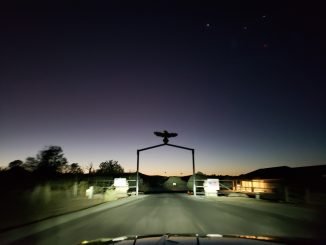

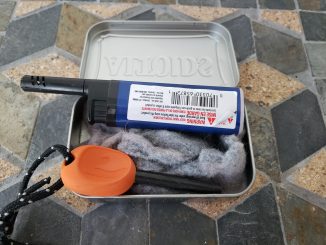
3 Trackbacks / Pingbacks